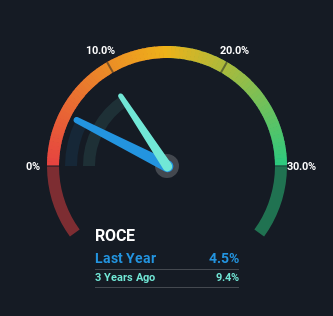- China
- /
- Specialty Stores
- /
- SHSE:600386
Beijing Bashi Media (SHSE:600386) Is Finding It Tricky To Allocate Its Capital

What underlying fundamental trends can indicate that a company might be in decline? Businesses in decline often have two underlying trends, firstly, a declining return on capital employed (ROCE) and a declining base of capital employed. This reveals that the company isn't compounding shareholder wealth because returns are falling and its net asset base is shrinking. In light of that, from a first glance at Beijing Bashi Media (SHSE:600386), we've spotted some signs that it could be struggling, so let's investigate.
Return On Capital Employed (ROCE): What Is It?
Just to clarify if you're unsure, ROCE is a metric for evaluating how much pre-tax income (in percentage terms) a company earns on the capital invested in its business. Analysts use this formula to calculate it for Beijing Bashi Media:
Return on Capital Employed = Earnings Before Interest and Tax (EBIT) ÷ (Total Assets - Current Liabilities)
0.045 = CN¥135m ÷ (CN¥4.4b - CN¥1.4b) (Based on the trailing twelve months to March 2024).
Therefore, Beijing Bashi Media has an ROCE of 4.5%. On its own that's a low return on capital but it's in line with the industry's average returns of 4.3%.
View our latest analysis for Beijing Bashi Media

While the past is not representative of the future, it can be helpful to know how a company has performed historically, which is why we have this chart above. If you'd like to look at how Beijing Bashi Media has performed in the past in other metrics, you can view this free graph of Beijing Bashi Media's past earnings, revenue and cash flow.
What Can We Tell From Beijing Bashi Media's ROCE Trend?
There is reason to be cautious about Beijing Bashi Media, given the returns are trending downwards. Unfortunately the returns on capital have diminished from the 11% that they were earning five years ago. Meanwhile, capital employed in the business has stayed roughly the flat over the period. Since returns are falling and the business has the same amount of assets employed, this can suggest it's a mature business that hasn't had much growth in the last five years. So because these trends aren't typically conducive to creating a multi-bagger, we wouldn't hold our breath on Beijing Bashi Media becoming one if things continue as they have.
The Key Takeaway
In summary, it's unfortunate that Beijing Bashi Media is generating lower returns from the same amount of capital. Investors haven't taken kindly to these developments, since the stock has declined 25% from where it was five years ago. Unless there is a shift to a more positive trajectory in these metrics, we would look elsewhere.
Beijing Bashi Media does have some risks, we noticed 4 warning signs (and 1 which doesn't sit too well with us) we think you should know about.
If you want to search for solid companies with great earnings, check out this free list of companies with good balance sheets and impressive returns on equity.
Valuation is complex, but we're here to simplify it.
Discover if Beijing Bashi Media might be undervalued or overvalued with our detailed analysis, featuring fair value estimates, potential risks, dividends, insider trades, and its financial condition.
Access Free AnalysisHave feedback on this article? Concerned about the content? Get in touch with us directly. Alternatively, email editorial-team (at) simplywallst.com.
This article by Simply Wall St is general in nature. We provide commentary based on historical data and analyst forecasts only using an unbiased methodology and our articles are not intended to be financial advice. It does not constitute a recommendation to buy or sell any stock, and does not take account of your objectives, or your financial situation. We aim to bring you long-term focused analysis driven by fundamental data. Note that our analysis may not factor in the latest price-sensitive company announcements or qualitative material. Simply Wall St has no position in any stocks mentioned.
About SHSE:600386
Flawless balance sheet unattractive dividend payer.

